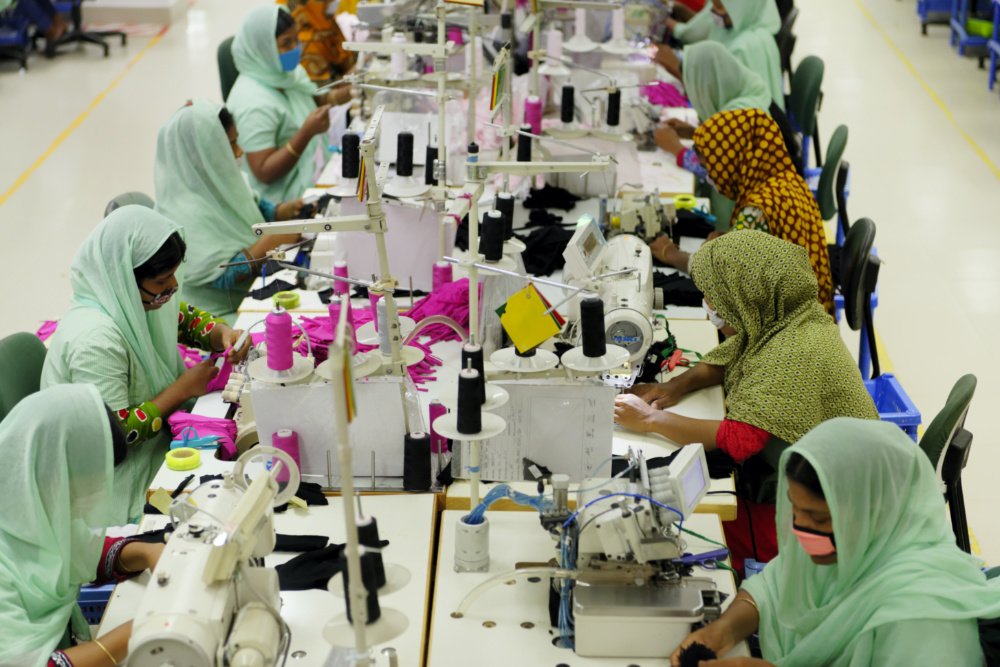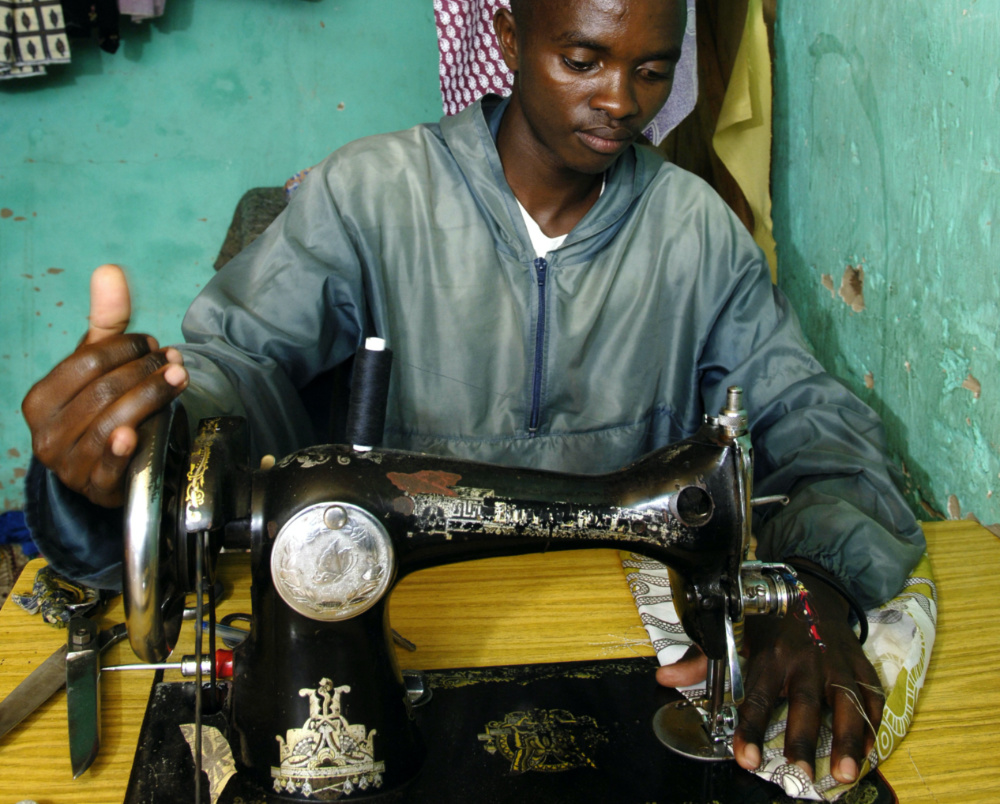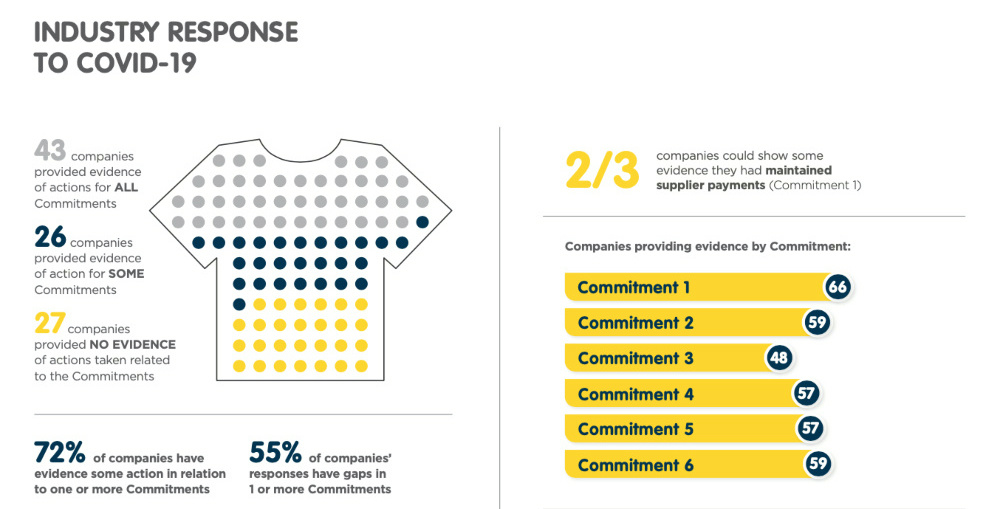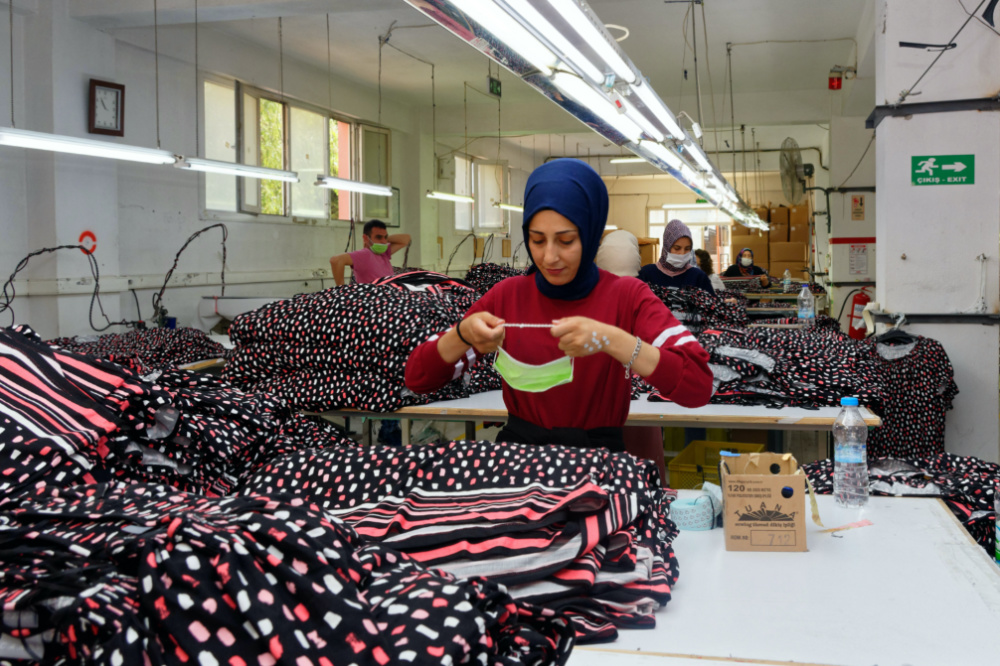
DAVID ADAMS reports on the findings – and the making – of a special edition of Baptist World Aid Australia’s annual guide to how well clothing companies which sell in Australia are ensuring ethical practices in their supply chains…
When the coronavirus pandemic began to sweep across the globe earlier this year, the garment industry was left in tatters. Retail sales plummeted, major fashion brands cancelled orders, and tens of millions of workers were stood down losing billions in wages. By May, more than 30 per cent of garment workers in the industry hub of Bangladesh were reporting that their children had gone without food as a result.
The impact was felt too at Baptist World Aid Australia where researchers had already started compiling its annual Ethical Fashion Report, looking at how well companies are ensuring ethical sourcing practices, when the pandemic struck. Forced to pivot, they decided this year’s report would require a different approach.

Tailors are seen working on a production line in a local garment factory in Bangladesh in 2016. PICTURE: Courtesy of Baptist World Aid Australia
Now in its 7th iteration, the report has traditionally ranked companies with a letter grade based on how much work they’ve done to ensure workers in their supply chains were protected. But this year, they’ve instead taken a more simplified approach and looked instead at how companies are performing against six benchmarks they have called the “COVID fashion commitments”.
“We realised that garment workers around the world were facing unique, immediate and really, really severe risks as a result of the COVID pandemic,” explains Chantelle Mayo, advocacy project manager for Baptist World Aid Australia who was involved in compiling the 2020 COVID Fashion Report and guide project.
“We realised that garment workers around the world were facing unique, immediate and really, really severe risks as a result of the COVID pandemic.”
– Chantelle Mayo, advocacy project manager for Baptist World Aid Australia.
“So we know that our research this year was, in many ways, more important than ever…It needed to keep going and it needed to be tailored to make sure that we were getting a good understanding of the risks that garment workers were facing and how companies were responding to those specific risks in the midst of the COVID pandemic. That really required a change to our research; [to] the targeted questions or the issues that we selected to address in the COVID fashion commitments.”
The six commitments – which, according to Mayo, also took into account the impact of the crisis on fashion companies, many of which she notes are “fighting for the economic survival” – cover everything from whether companies are supporting workers’ wages by honouring existing commitments to suppliers to whether they are ensuring workers’ rights and safety are being respected in their supply chains and listening to the voices and experiences of workers. They also weigh up whether companies are identifying and supporting workers at greatest risk, whether they are collaborating with others to protect vulnerable workers, and how they are looking to “build back better for workers and the world”.
Mayo says that while still “inspired by the key areas usually addressed in BWAA’s longer survey”, the six COVID statements are tailored more specifically “to the risks facing workers and the ability of companies to actually answer questions and provide evidence to help understand what they are doing in this time of need”.
“[W]e realised there was a big decrease in visibility over supply chains,” she says. “And that meant that there were incredibly high risks for worker exploitation, for forced labour, for child labour and, on a grander scheme, of workers falling into poverty or being pushed into more dangerous situations as they attempt to find work and don’t have any place to turn.”
“That’s why the COVID fashion commitments really drive companies to increase communication with [their] suppliers, make sure [they’re] talking to the workers, that [they] understand what their situation is, that [they] respond as much as [they] can to what they need; providing the support that they need to ensure that garment worker wellbeing is prioritised…”

A tailor at work in his shop in Kigali, Rwanda, in 2007. PICTURE: Courtesy of Baptist World Aid Australia
The methodology involved grouping the 96 companies in the report – which represent some 428 brands – into one of three different categories according what, if any, action they could show they had taken with regard to the six commitments.
The report found that while 66 per cent of the 96 companies listed in the report could demonstrate they were supporting workers’ wages by honouring existing supplier commitments (fashion commitment one), this dropped to 59 per cent when it came to identifying and supporting workers at greatest risk (commitment two) and a commitment to “build back better for workers and the world” (commitment three).
Some 57 per cent of companies could show they were ensuring workers’ rights and safety are respected (commitment four) while the same percentage could demonstrate they were collaborating with others to protect vulnerable workers (commitment five). But just 48 per cent could show they were listening to the voices and experiences of workers (commitment three).
Overall, almost half (43) of the 96 companies in the report – representing 45 per cent – could provide evidence they had taken action on all six commitments. These included companies such as Adidas, Levi Strauss & Co, Hanesbrands, H&M, Cotton On Group and UNIQLO.
A further 26 companies – including Industrie, Nike, Ralph Lauren and Rip Curl – could show evidence of actions towards some of the six commitments. But 27 companies – including Ben Sherman Australia, Boohoo and RM Williams – provided no evidence of actions taken with regard to any of the commitments (all three companies we’ve mentioned as being in the latter group) were among those which didn’t provide any information directly to the research team and were assessed based only on what was publicly available.

Source: Baptist World Aid Australia 2020 COVID Fashion Report
The report also showed that companies which, based on previous fashion reports, had a track record of strong ethical practices coming into the pandemic were almost seven times more likely to be able to provide evidence they had taken action towards the six COVID commitments.
“That really is an overwhelming indicator that companies that have a good foundation in times when things are ‘business as usual’ are far more equipped to respond to the increased risk the garment workers are facing during the crisis,” says BWAA’s Mayo.
“And also, to bounce back…because they know their supply chains, they’ve traced it to a large extent, they have strong relationships with their suppliers, they understand the fibres and materials which go into their clothes and where they come from. So for that reason they’re just in a far better position to pivot however they needed to; to respond to the issues that the crisis presented to them. So we really want companies to hear that message – that if you invest in these measures during good times, you’ll be in a really good position to respond during a crisis…”
Mayo says there is also a payoff for companies with a strong track record of ethical sourcing in terms of consumer perceptions.
“Some research we did at the end of 2019 showed that more than 80 per cent of consumers say clothing companies should pay workers fairly and provide safe working conditions,” she says. “So, there really is a push from consumer side of things as well for companies to incorporate ethical sourcing practices and prioritise garment worker wellbeing in their supply chain…”
That same research also revealed that 60 per cent of fashion consumers expect clothing brands to be transparent about what they do and that 47 per cent of consumers say they were willing to pay more for ethically produced clothes.

Despite the challenges of COVID, textile workers continue to work with their masks ii Izmir, Turkey in June. PICTURE: Courtesy of Baptist World Aid Australia
Mayo says it is hoped that, with a spotlight on the impact of the coronavirus pandemic on garment workers around the world, consumers would increasingly consider the ethics behind the clothing they wear when purchasing.
She says research from McKinsey shows there has been a large increase this year in consumers doing more research and being more deliberate before making purchases of any kind.
“It really shows that…this crisis could be a catalyst of change for many people…We really hope that it will call consumers to speak up more, to use their voices, to use their consumer power to encourage their favourite brands to invest in ethical sourcing and improve their practices in the future.”
To help drive that change, Baptist World Aid Australia has produced a COVID Fashion Guide which consumers can download for free and carry with them when shopping.
While it doesn’t grade brands as it has in previous years, Mayo says this year’s guide aims to “equip consumers with the tools that they need to take the next steps in their ethical sourcing journey, no matter what stage they’re at now”.
“We really want consumers to understand, no matter what your style, what your budget, what your knowledge is of ethical sourcing and of garment worker exploitation in the fashion industry is up to this day, you have the power to make a difference, you have the ability to vote with your wallet and show companies that…consumers really care about these issues.”
– Chantelle Mayo
The guide includes tips on what to consider when making a decision in the store including looking at an item’s country of origin, how sustainable the material it’s made of is, and whether it has any certifications which show a commitment towards improving supply chain practices.
“We really want consumers to understand, no matter what your style, what your budget, what your knowledge is of ethical sourcing and of garment worker exploitation in the fashion industry…you have the power to make a difference, you have the ability to vote with your wallet and show companies that…consumers really care about these issues.”
Mayo says the report is a celebration of the “really incredible” work many companies have done to ensure workers in their supply chains are supported.
“And we want to make sure we recognise that because the fashion industry has really, really struggled and we know companies have had it hard so we want to recognise their efforts in this area,” she says. “But we do also want to make sure that clothing companies are aware that these issues haven’t gone away and consumers still want to see them…really committing to ensure that their supply chain ultimately becomes free from worker exploitation. That goal is still very much present…”





